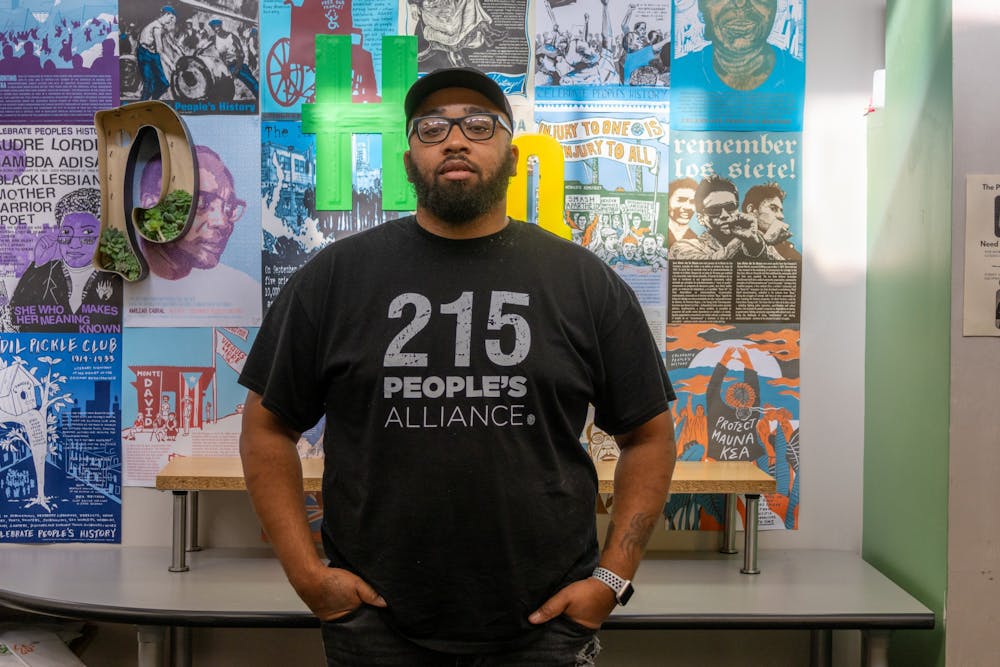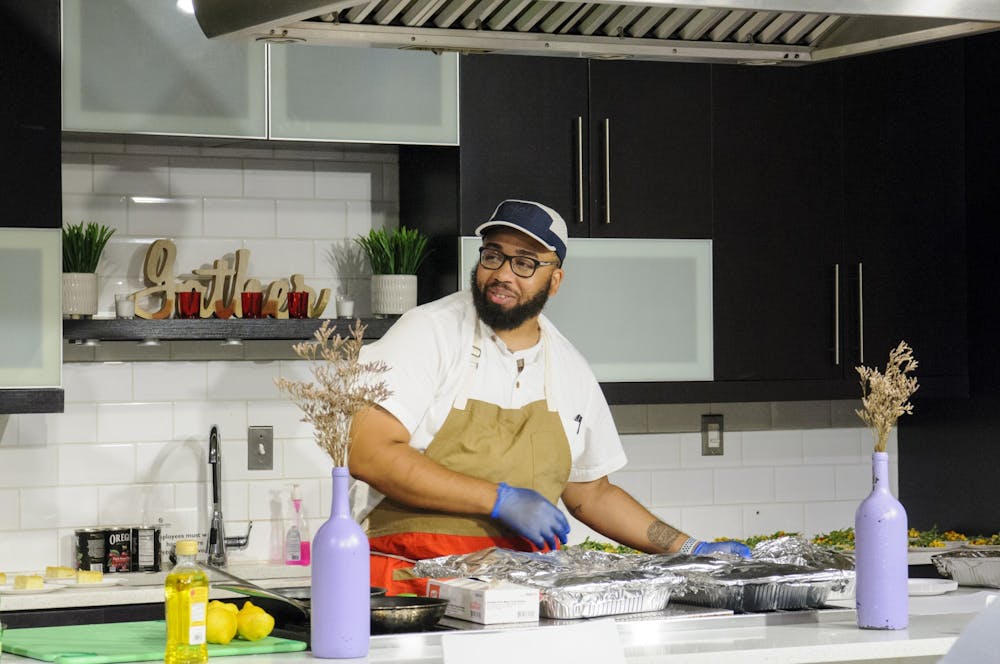Content warning: The following text describes an incident of sexual assault, which can be disturbing and/or triggering for some readers. Please find resources listed at the bottom of the article.
Kurt Evans, born and raised in Southwest Philadelphia, is a chef by trade. His career aspirations were nurtured by the intimate relationship between food and family he experienced growing up. “I got involved in cooking at an early age through my grandmothers,” whom Evans affectionately dubs “cooking machines.”
“They had big families, so they did a lot of cooking,” he says.
With over a decade's worth of experience in the culinary field under his belt, Evans has earned himself the nickname “cheftivist”’—a nod to his penchant for using food and cooking as a method of activism. He sees food “as a vehicle to be able to talk about mass incarceration, food insecurity, [and] racial systemic issues.”
Specifically, Evans is passionate about criminal justice reform. Watching several of his own family members go to prison added a personal dimension to his fight against mass incarceration.
According to The Sentencing Project, there are two million people incarcerated in the United States, more than any other nation in the world per capita. Over the past 40 years, the number of incarcerated people has increased by 500 percent due to changes in sentencing law and policy rather than an increase in crime rates, with Black and brown people being disproportionately impacted by this trend. In fact, studies suggest that mass imprisonment has not contributed significantly to crime reduction, highlighting the dysfunction of America’s criminal justice policy.
While most people would call Evans an activist, he prefers the term “organizer.” In fact, he feels that the label “cheftivist,” though used with good intent, is often inaccurate to the work he does. “Activism is to the point where you’re being reactive to something—organizing is being proactive,” he says.
The ethos that drives Evans’ work is simple: He wants to help his community, using his skills as a chef to organize for justice. “There have been so many issues that have been compounded on society,” he says. “How can we educate people in ways where they [know where] to get help?”
Six years ago, Evans started holding a series of dinner events that center conversations about the criminal justice system, aptly named the End Mass Incarceration (EMI) Dinners. Since then, he’s spearheaded successful EMI dinners in all corners of the United States—from Alaska to Texas to New York—but most of his recent work is concentrated in his hometown of Philadelphia.
The newest iteration of the EMI series is called Stories of Resilience. At each dinner, a formerly incarcerated individual who’s since engaged in advocacy work is highlighted and invited to share their story with attendees. “They’re doing preventative work to stop people from going [back] to jail in their re–entry stage,” he says. As the guest of honor speaks, everyone is served dinner, prepared in part by Evans.
I was invited to attend the most recent EMI dinner on Sept. 10 at the Dorrance H. Hamilton Center for Culinary Enterprises in West Philly. When I arrived, Alexandra Hunt, who ran for Pennsylvania’s 3rd Congressional District this year on a progressive platform, was already seated at a table, chatting enthusiastically with the person sitting next to her. Past iterations of Evans’ EMI dinner series have drawn several other local politicians, including District Attorney Larry Krasner and Councilmembers at–large Kendra Brooks, Isaiah Thomas, and Helen Gym.
As more guests slowly filtered into the dining area, introductions were exchanged, as well as warm greetings between friends. Evans notes that many attend more than one dinner, a testament to the series’ ability to not only raise awareness of the need for prison reform, but also build a community of advocacy in the process.
Before the presentation began, my table mate, Sampson Jean–Louis, enthusiastically shared that this was also his first time attending one of Evans’ EMI dinners. He was particularly excited to have gotten a seat at that night’s event because pineapple upside–down cake was on the menu—one of his favorites. A spicy mango salad and mahi–mahi with rice and green beans were also served.
Evans encourages attendees to sit with people they don’t already know to facilitate the exchange of personal stories. During our conversation, Jean–Louis told me about an elderly man who’d been previously incarcerated. After his release, he went on to work—and eventually retire from—a position with the government. He said to me several times, “You would never guess that he had been to jail.”
During our interview, Evans speaks to this point: He’s using the EMI dinner series as a platform to create a narrative shift. “People look at these individuals as not worthy. [They think,] ‘Lock them up, throw away the key, don’t let people out,’” he says, but his events get “real people … to tell real stories about their lives and how they got to where they are.”
As the dinner began, guest speaker Cynthia Alvarado described the work she’s done to transform her own narrative and those of other incarcerated individuals. In 2010, she was wrongfully convicted and sentenced to life without parole. In 2020, she successfully appealed her case and was released from prison—something few other people in her position have the legal knowledge or resources to accomplish.

Aided by questions from local judicial candidate and friend Caroline Turner, Alvarado told the story of her encounter with the criminal justice system.
She opened by detailing the story of a devastating car accident she was involved in—one that tragically killed her uncle. Alvarado also suffered serious injuries, including a broken pelvis. The trauma of the accident led her to begin self–medicating with Xanax in an attempt to numb the physical and emotional pain.
In October 2008, Alvarado drove to Fairhill Square Park in North Philadelphia in search of Xanax, accompanied by her cousin, Oscar Alvarado. She waited in the car as her cousin secured the medication. When he came back, he was holding a gun and instructed her to drive away. In the panic of the moment, Alvarado complied. Soon after, she found out that he had killed a woman named Marta Martinez–Lozada.
Alvarado was never aware of what her cousin had planned, and she didn’t participate in the actual murder. However, a judge’s decision and the Pennsylvania felony murder statute led to her second–degree murder conviction, which carried a mandatory life sentence without parole.
Alvarado spent 18 months at the Riverside Correctional Facility, a prison in North Philly. In prison, Alvarado was subjected to multiple types of abuse by the guards. She was forced into solitary confinement for eight months and raped.
Alvarado cried as she recounted her incarceration, but she still managed to speak with impassioned clarity about the substandard health care and lack of resources within the prison system, repeatedly telling the audience that “women are dying in there.”
After Alvarado finished her speech, the floor was opened to questions, which evolved into a lively discussion as the night progressed. Between courses, participants offered their ideas on how best to combat mass incarceration. Alvarado munched on green beans with a concentrated look on her face, interjecting every once in a while with her opinion.
Through the EMI dinner, Evans gave Alvarado the platform to use her experience to generate a night of advocacy, learning, and engagement. The money raised from donations made by dinner attendees was presented to Alvarado at the end of the event, a contribution to support her work, since activism tends to pay very little as an occupation.
“Storytelling is very healing,” Evans says. “It’s not so much of just talking about mass incarceration, it’s actually hearing someone that has been incarcerated.”
Sarah Gager, a two–time attendee of the EMI dinner series, seems to agree. “These prisoners have a story to tell,” she says, “and it’s not the story that ends up on the police report or the court docket. There’s much more to the story, and the EMI dinners let you look at the situation in a holistic way.”
But these dinners aren’t just educational—they’re also transformative. Gager says, “The [EMI dinners] to me are just very moving, and I’m usually in tears while I’m eating.” By highlighting the stories of formerly incarcerated people, Evans’ EMI Dinners challenge prior conceptions of imprisonment in an empathetic, human–oriented way.

In addition to hosting the EMI dinners, Evans also devotes much of his time to his role as an organizer for the 215 People’s Alliance, a multiracial collective dedicated to building poor and working–class solidarity and justice in Philadelphia. 215 interviews political hopefuls, endorses policy changes, recommends judicial candidates, and calls for prosecutor accountability, among other undertakings. Although he was originally hired to a temporary position during District Attorney Krasner’s campaign, Evans is now 215’s mass liberation organizer.
Within his role at the 215 People’s Alliance, Evans founded Justice for All (J4A), a volunteer group “committed to ending mass incarceration and reimagining what community safety looks like.” Currently, J4A is involved with Voices of the Unheard, a project whose purpose is to collect, share, and center the stories of those who are incarcerated. Robert “Mjasiri” Dowell, who’s currently on year 12 of his 25–year prison sentence, is the project creator.
He initially reached out to Jaime Sullivan, a member of J4A, who ultimately brought the idea to Evans’ attention. Dowell’s collaboration with J4A will culminate in an art exhibit at the Urban Art Gallery on Dec. 10 and Dec. 11. Visitors will be able to interactively listen to audio recordings of participants who shared their stories and view various other artworks done by incarcerated individuals.
In a phone interview with Dowell, he says of his aspirations for the project, “I’ve never seen anything out there telling our stories in a positive light, even though there are individuals who were formerly incarcerated that came home and are doing well.” He wants to gain support by sharing the personal stories of inmates and motivate the public to take action toward ending mass incarceration.
Although J4A is coordinating the exhibit from the outside, leveraging their resources to help Voices of the Unheard succeed, Evans stresses that the project is Dowell’s at its core. The two of them talk on the phone multiple times a week so that the final product presented to the public reflects Dowell’s vision. “You need to understand that everything here is for the [incarcerated] individuals. They should get the reverence. I take pride in helping behind the scenes,” Evans says. Those who shared their stories for the exhibit will be compensated for their time using grant money.
On Sept. 7, during a weekly J4A Zoom meeting, Evans, Sullivan, and Beatrice, another J4A member, reviewed the logistics and marketing approach for the Urban Art Gallery event. After about half an hour, Sullivan got a call from Dowell, who joins the J4A meetings to discuss Voices of the Unheard in addition to his frequent one–on–one conversations with Evans.
“This is a prepaid collect call from an incarcerated individual at SCI Coal Township. This call is not private. It will be recorded and it may be monitored,” the automated prison phone system warned. Immediately after, Dowell and the team got to work.
When talk of exhibit graphics subsided, Evans suggested that Dowell and other incarcerated individuals contribute to another project in the works at J4A. They’re collecting questions, such as, “What kind of education and counseling services can the government provide for children to end the school–to–prison pipeline?” to create candidate forums on mass incarceration reform.
Many local political hopefuls are inclined to engage with the 215 People’s Alliance to garner support for their campaign. For example, Pennsylvania Attorney General Josh Shapiro, who is now running for governor of Pennsylvania against GOP extremist state Senator Doug Mastriano, has already been interviewed by 215.
Eventually, conversation turned away from J4A altogether, becoming an informal, but nonetheless thoughtful, deliberation on the failures of the criminal “(in)justice” system—as Dowell prefers to call it. These passionate, organic conversations seem to be typical in Evans’ work, since he and Dowell launched into a similar unprompted discussion at the end of our first phone interview.
Dowell emphasized the importance of creating safe places for kids to play. The needs of children who are exposed to daily trauma are not being addressed. Instead, they bottle up their feelings, leading to behavioral problems, and, all too often, stints in juvenile prison.
Alvarado made a similar point when she emphasized that the details of her uncle’s death, and her subsequent struggle with mental illness and self–medication, were never discussed during her trial. In Dowell’s opinion, the government is uninterested in ameliorating these systemic inequities, failing to provide funding for prevention programs—such as trauma–informed mental health services—that could create change.
Fourteen surprisingly jam–packed minutes later, the robotic voice returned, this time informing us that there was one minute left on the call. A chorus of thank yous and goodbyes followed. Evans tells me he and Dowell always make sure to say goodbye and hang up before the system ends the call—a reclamation of agency and humanity in the heavily regimented criminal (in)justice system.
Although Evans doesn’t directly work with food in his position at the 215 People’s Alliance, he insists that, for him, it’s all connected. Food and advocacy are inextricably intertwined.
From Down North Pizza to the EMI dinner series to his work with J4A and the 215 People’s Alliance, Evans brings a uniquely creative and entrepreneurial energy to every project he touches. “He is tireless and he has a mission. … When I’m listening to the news, having a nervous breakdown, he’s just chugging along. He’s a positive force,” says Gager.
While the daunting nature of organizing may leave some people paralyzed, Evans says that his enduring passion for the cause is what motivates him. And by incorporating his love for food into much of his advocacy, Evans has managed to put his own creative spin on an ongoing, citywide fight for criminal justice reform.
The connection between food and social justice work might not seem particularly obvious at first glance, but sharing meals has the capacity to spark hope and camaraderie among people of all walks of life—and that’s what makes it essential to Evans’ mission.
“People may not drink coffee or tea, people may not drink liquor, but you can get people together over food,” Evans says. “Food is what brings people to the table.”
Campus Resources:
The HELP Line: 215-898-HELP: A 24–hour–a–day phone number for members of the Penn community who seek help in navigating Penn's resources for health and wellness.
Counseling and Psychological Services: 215-898-7021 (active 24/7): The counseling center for the University of Pennsylvania.
Student Health Service: 215-746-3535: Student Health Service can provide medical evaluations and treatment to victims/survivors of eating disorders, regardless of whether they make a report or seek additional resources.
Reach–A–Peer Hotline: 215-573-2727 (every day from 9 p.m. to 1 a.m., texting available 24/7), A peer hotline to provide peer support, information, and referrals to Penn students.

